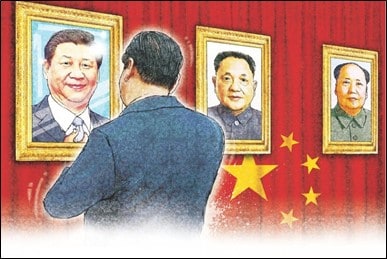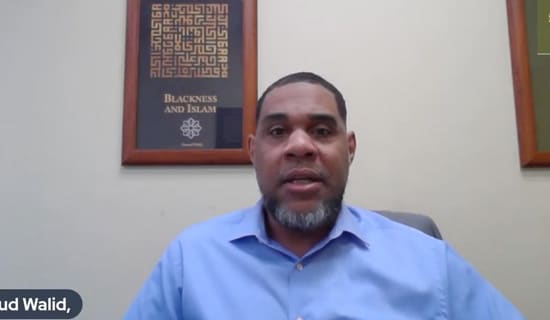The following is the first of a series of analysis in English and in Chinese by Chinese dissident and expert Chris King, who is a Senior Research Fellow for the MEMRI Chinese Media Studies Project, on the personality cult of Chinese President Xi Jinping. King was an active participant in the student protests in China in 1989,
Xi Jinping is engaged in a personality cult. He has now lifted his own term limit as head of state, and revised the Party's history to give fundamentally positive credit to the Cultural Revolution and Mao Zedong – a significant change in direction that is clear and worth watching closely. But I don't think he can reach the level of Mao's cult of personality. The main reason for this is not that the people have been enlightened, but that Xi Jinping lacks authority. At the same time, he also wants to take advantage of Deng Xiaoping's legacy, which is that China's rapid economic development has been achieved through capitalism. At least in the short term, I don't think he will fully implement the nationalization of enterprises and the public ownership economy, because the private sector is efficient, fast-changing, adaptable, and dynamic.

(Illustration by Henry Wong)
Xi Jinping Should Not Have Been Talking About Marxism At All
If Xi is to keep his grip on power and maintain economic growth – the Party's only tenable source of legitimacy – then he cannot kill the goose that lays the golden eggs (i.e. the private sector). However, the private sector must be obedient, and must accept Beijing's control, or business owners will face the same fate of the likes of Jack Ma.[1] Xi Jinping wants to erase the contradictions between the first 30 years of the Mao Zedong era and the second 30 years of the Deng Xiaoping era, seamlessly link the two 30-year periods of history, and take the legacies of Mao and Deng and use them both for his own benefit. He might have been proud of his design, but it is dangerous and nearly mission impossible, especially with his own prestige, vision, and talents.
Even in the view of the Marxist patriarch whom Xi reveres, this would not work. Marxism holds that the economic base is the source on which the superstructure depends, and is primary. The superstructure is the expression of the economic base in politics and ideology, and it is secondary and derived. The economic base determines the superstructure, and the superstructure reacts on the economic base. The superstructure must meet the needs of the economic base and its development; otherwise, it cannot survive for long.\
From this point of view, Xi Jinping should not have been talking about Marxism at all. He is now determined to portray Deng's line as a continuation and development of Mao's line, which is in fact contradictory and precisely anti-Marxist.
This is because a return to the orthodox Mao era means eliminating private ownership, or at least making it very secondary – otherwise, it is not Mao's orthodoxy. But this is something he cannot do right now. On a recent visit to Guangxi province, he once again urged the private sector to grow with confidence: "We encourage the development of private enterprises," Xi said, after visiting a private enterprise in Guangxi province on April 26, 2021. He added: "The Party and the state support private enterprises when they encounter difficulties and provide guidance when they are confused, in the hope that private enterprises can feel at ease and develop boldly."
It is well known that Deng Xiaoping abandoned Mao Zedong's communist ideology. He changed China's direction, embarking on the path of reform and opening up, introducing the capitalist development system, and beginning to implement the so-called Socialism with Chinese Characteristics. China's economy and overall national strength rose rapidly. Deng's reform was bound to adopt a passive attitude of obscurity and avoidance with regard to ideology.
If people do not derive support from the forces of spiritual, moral, and faith under material stimulation, or if they take material wealth itself as spiritual support and an object of worship, then the entire society inevitably becomes corrupted.
In fact, in the early stage of the reform, Deng Xiaoping consciously indulged corruption in order to buy power and the support of the Party elders – which was also the cause and main trigger point of the June 4, 1989 Tiananmen democracy movement.
SUPPORT OUR WORK

With the rapid expansion and enrichment of China's material wealth, corruption was becoming an increasingly serious problem. China's rapid rise to the status of the world's second-largest economy under Hu Jintao, Deng Xiaoping's handpicked successor as the CCP chief, was been accompanied by rampant corruption within the Party and in society that was nearly out of control.
Xi Believed That Mao's Dictatorship And Personality Cult Were The Only Way To Keep The CCP Unified
Under Hu Jintao, the CCP was fragmented and corrupt. Facing the growth and resistance of China's civil society, the Communist Party authorities could only maintain a passive defensive position and retreat steadily. Meanwhile, the Communist Party's liberal wing advocated universal values and intra-party democracy, echoing liberal democratic activists outside the Party. Hu was no longer able to control the situation effectively because his supreme power was divided.
At that time, the nine-member Politburo Standing Committee of the CCP exercised collective leadership, with each member having his own area of responsibility, and the Party's General Secretary lacked absolute authority. The General Secretary's lack of power had created an awkward situation in which decisions made at the highest levels of the Party and the Central Government went unheeded. Local Party committees and governments had different degrees of centrifugal tendencies towards the Central Committee of the CCP and the Central Government in Beijing. The CCP's power and ruling position was in danger.
Xi Jinping came to power in 2012, drawing on the lessons of Hu Jintao's time in power. In Xi's view, if this situation could not be quickly reversed, and was allowed to continue, it would doom the Communist Party and China, and he would not allow himself to be the "monarch of a fallen Party and country." Starting with anti-corruption and military reform, Xi Jinping began to consolidate his power and position with an iron fist. Under such circumstances, how could the organization and thinking of the whole Party be unified? Xi believed that Mao Zedong's dictatorship and personality cult were the only way this could be done.
However, Xi Jinping's attempt to combine the two widely divergent approaches of Mao Zedong and Deng Xiaoping has led him into a vicious circle of antimony. Not only has he created an incongruity, pleasing neither left nor right, but a further development of this situation threatens to cause the collapse of the Communist Party.
So the question is: "How can Xi Jinping, who wants to follow Mao's path on the political side, and Deng's path on the economic side, connect the two?" God only knows. This may reflect the saying "The ignorant are fearless."
*Chris King is Senior Research Fellow for the MEMRI Chinese Media Studies Project.
习近平对内为了权力和独裁搞个人崇拜,而且想把毛和邓的遗产同时据为己有
习近平正在搞个人崇拜,他现在已经取消了对自己担任国家元首的任期限制,修改了党史,对文革和毛泽东予以肯定,这个方向的重大变化很明显值得我们密切关注。不过我认为他无法达到毛的那种个人崇拜程度,最主要的原因倒不是民智已开,而是习近平的权威不够。同时,他也想利用邓小平的遗产,那就是经济上通过资本主义方式实现快速发展,至少短时间内我认为他还不会完全搞经济国有化,公有制,因为私营企业效率高,转向快,适应性强,充满活力。他要想稳定掌权,要想维持经济发展这个中共唯一还算站得住脚的执政合法性来源,这只生金蛋的鹅还不能杀。但私营经济必须听话,必须被北京所能够掌控,否则就会面临马云等人的结局。(注:马云因为在2020年10月底顶撞中共高层,导致不仅本人被限制出境,旗下的企业上市被叫停,而且阿里巴巴集团还因为所谓垄断问题被罚款近30亿美元。)习近平要把中共统治中国后毛和邓执政的前后两个三十年打通,无缝对接在一起,从而实现毛、邓通吃,皆为自己所用。他可能会为自己的这种设计感到得意,但这样做其实相当危险,也是几乎不可能完成的任务,尤其是凭借他本人的威望、视野和才能,更加难以做到。
即使是按照习近平所尊崇的马克思主义祖师爷的观点,这种做法也是行不通的。马克思主义认为:经济基础是上层建筑赖以存在的根源,是第一性的;上层建筑是经济基础在政治上和思想上的表现,是第二性的、派生的。经济基础决定上层建筑,上层建筑反作用于经济基础。有什么样的经济基础,就会有怎样的上层建筑,而上层建筑必须符合经济基础及其发展的需要,否则就不能长期存在下去。
从这个角度来看,习近平根本不应该讲马克思主义,而他现在要把邓的路线说成是对毛的路线的继承和发展,这实际上是自相矛盾,恰恰是反马克思主义的。
要回归正统的毛时代,就意味着必须干掉私有制,至少也要让私有制成为一条尾巴,居于非常次要的位置,否则就不是毛的正统。但这是他目前无法做到的。他最近在广西访问,又一次安抚私营企业,要他们放心发展。(注:2021年4月26日,在广西考察的习近平参观了一家私营企业之后表示:“我们鼓励民营企业发展,党和国家在民营企业遇到困难的时候给予支持、遇到困惑的时候给予指导,就是希望民营企业放心大胆发展。”)
众所周知,邓小平治国抛弃了毛泽东的共产主义意识形态信条。他让中国改变方向,走上改革开放的道路,引入资本主义的发展体系,开始推行所谓中国特色社会主义,中国经济和整体国力迅速提升。邓的改革,势必在意识形态领域采取的是虚化、回避的被动姿态。
人们在物质的刺激下,如果没有精神、道德和信仰力量的加持,或者把物质财富本身作为精神支柱和膜拜的对象,那么全社会的腐败就不可避免。
实际上,在改革的初期,邓小平为了收买权力和元老的支持,曾经有意识放纵腐败,这也是六四天安门民主运动的起因和主要触发点。随着中国物质财富的迅速扩大和丰富,腐败呈现出愈演愈烈之势。在邓小平时代的后期,他亲手选定的接班人胡锦涛上台,中国迅速跃升为世界第二大经济体,但同时中共党内和社会的腐败也达到濒临失控的程度。
胡锦涛时期,中共党组织涣散,腐败滋生。面对公民社会的成长和抗争,当局被动防守,节节败退。同时中共党内的开明派力量倡导普世价值和党内民主,和党外的自由派人士相互呼应。胡锦涛已经无法有效掌控全局,他的最高权力被分割,中共最高领导层出现“九龙治水,各管一摊”(注:指当时中共政治局九名常委,实行的是集体领导,各自有分管的领域,党的总书记没有绝对权威。)的格局,总书记的大权旁落,出现了政令不出中南海的窘境。地方党委和政府对中央不同程度出现了离心倾向。中共的权力和执政地位相当危险。
习近平上台,汲取了胡锦涛执政时期的教训。在习看来,这种形势如不迅速扭转,任其发展下去,就会“亡党亡国”,而他不能做“亡国之君”。习近平以反腐败和军队改革入手,开始大力集权,以强硬的铁腕手段巩固自身权力和地位。这种情况下如何统一全党的组织和思想?他认为只有靠毛泽东搞的独裁和个人崇拜那一套办法。
但是,习近平想把毛泽东和邓小平这两条截然不同的路线糅合在一起,就陷入了二律背反的怪圈,不仅搞得不伦不类,左和右两边都不讨好,而且事态进一步发展下去,同样面临中共崩盘的危机。
所以不禁要问,习近平政治上想走毛的路线,经济上至少想延续邓时代的做法,这两者如何嫁接?只有天知道。这也许就是人们常说的“无知者无畏”吧。
[1] In late October 2020, Chinese business magnate Jack Ma defied the Communist Party's top leadership, and was subsequently banned from leaving China; additionally, the IPO of one of his companies was suspended, and his Alibaba Group was fined nearly $3 billion for alleged monopoly violations.




